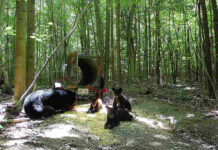SALEM, Ohio – The soybean growers and traditional biodiesel producers are on one side; livestock producers, the world’s largest meat processor and a global energy company are on the other.
In April, Tyson Foods and ConocoPhillips announced a new alliance to use beef, pork and poultry byproducts to create a renewable diesel. ConocoPhillips developed a proprietary technology to use animal fat from Tyson’s rendering plants to produce diesel fuel that meets federal standards for ultra-low-sulfur diesel.
Tax credit. But the new process also received an OK from the departments of energy, treasury and the Internal Revenue Service to get a $1/gallon tax credit. And that’s what’s fired up the National Biodiesel Board and state soybean councils.
ConocoPhillips said production is expected to reach 175 million gallons per year when the process is up and running.
“The ruling means oil companies, like ConocoPhillips, can take advantage of a dollar-per-gallon federal tax incentive for merely adding raw vegetable oils and animal fats into their oil refineries,” said Hardin County soybean producer Jan Layman, who sits on the Ohio Soybean Council boards and the National Biodiesel Board.
Six Ohio soybean growers and two staff members of the Ohio Soybean Association attended a town hall meeting ConocoPhillips hosted May 30 in Akron to voice their concerns.
Loophole. “We’re not against them going out and looking at ways to lessen dependence on foreign oil, or to invest in technology that deals in renewable fuels,” said Jamie Mossbarger, soybean association communications director. “But the original intent of the tax credit was to benefit entrepreneurial, startup companies.”
Steve Lankenau runs one of those startup companies, American Ag Fuels, headquartered in Defiance, Ohio. He’s not afraid of competition, but that’s not how he sees the Conoco-Tyson alliance.
“If they produce biodiesel, more power to them,” he said. “But that’s not what’s going on here.”
“It’s a loophole.”
American Ag Fuels formed in 2004 and started biodiesel production in July 2005. Last year, it produced about 1 million gallons, distributing the bulk of it within a 75-mile radius of Defiance.
“It dilutes what we’re doing,” Lankenau said, “and it severely impacts the support for this incentive.”
The tax credit will expire at the end of 2008. The National Biodiesel Board estimates there are currently 105 small biodiesel plants eligible to receive the credit. Ohio is home to three biodiesel plants, with a combined production capacity of 50 million gallons.
Losing the credit, Lankenau said, would be “devastating.”
“We would continue, but we wouldn’t grow.”
American Ag Fuels is completing an expansion of its facility and is looking at a new production facility in Cleveland, said Lankenau, the company’s chief executive officer.
Opportunity. ConocoPhillips and Tyson see the new project as good business sense.
“This strategic alliance is a big win for the entire agricultural sector because it paves the way for greater participation of fats and oils in renewable fuels,” said Richard Bond, Tyson president, in an April news release announcing the alliance.
The National Cattlemen’s Beef Association likes the alliance because it uses byproducts that are not being used, according to Colin Woodall, executive director of legislative affairs.
“Whatever bio- or renewable diesel that’s out there that can use our waste stream, that’s where we want to focus,” Woodall said.
Legislation. Rep. Lloyd Doggett, D-Texas, introduced legislation May 17 to disallow the credit for renewable diesel in the case of fuel coproduced with petroleum, natural gas or coal feedstocks.
Referred to the House Committee on Ways and Means, the bill currently has 58 co-sponsors including Ohio’s Marcy Kaptur and Betty Sutton, and Pennsylvania’s Allyson Schwartz.
David vs. Goliath. “It’s a classic case of David and Goliath and we’re the little guy with the little stones and they’re the big guy with the shield and spear,” Lankenau said. “The proportions are just enormous in contrasting them to us.”
“They’re acting in their own best self-interest, but I don’t think it’s in the public interest.”
ConocoPhillips expects to begin production of the renewable diesel in late 2007.
(Farm and Dairy Editor Susan Crowell can be reached at 800-837-3419 or at editor@farmanddairy.com.)
Get 4 Weeks of Farm and Dairy Home Delivered









